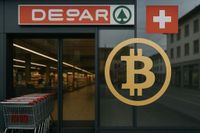Spar, a global grocery giant, has taken a significant step towards the mainstream adoption of cryptocurrency by rolling out Bitcoin-based payments at a supermarket in Zug, Switzerland. This initiative not only marks Spar's entry into the world of digital currency but also highlights the growing acceptance of Bitcoin in everyday transactions.
The announcement was made on April 17, 2025, by DFX Swiss, a company specializing in crypto-to-fiat payment solutions. According to their LinkedIn post, this Spar location is among the first supermarkets in Switzerland to allow direct Bitcoin payments at checkout via the Lightning Network. "This SPAR location is among the first supermarkets in Switzerland where you can pay directly at the checkout using Bitcoin (via LNURL), thanks to our new #OpenCryptoPay solution – an open P2P standard for in-person crypto payments," DFX stated.
Switzerland has long been recognized as a crypto-friendly jurisdiction in Europe. In 2023, the city of Lugano made headlines by adopting Bitcoin and Tether USDt (USDT) payments for all municipal fees, positioning itself as a leader in cryptocurrency adoption. Currently, there are 1,013 stores and businesses accepting Bitcoin payments across Switzerland, according to BTCmap data.
Spar operates over 13,900 stores in 48 countries, serving approximately 14.7 million daily shoppers and employing around 450,000 people worldwide. With such a vast network, the company's move to accept Bitcoin could significantly influence the mainstream acceptance of cryptocurrency in retail.
One of the essential features of Spar's Bitcoin implementation is its ease of use. Customers can pay by simply scanning a QR code at checkout. This user-friendly approach addresses common criticisms regarding the complexity of cryptocurrency transactions. Rahim Taghizadegan, a university lecturer and director of Bitcoin Association Switzerland, highlighted this in an April 16 LinkedIn post, stating, "Just scan a static QR code, send sats, immediate and easy registration by the cashier. If enough people use it, it may be rolled out in the whole country." Taghizadegan noted that he used the Phoenix Wallet for the Lightning Network, indicating that various wallets can facilitate these transactions.
As the cryptocurrency landscape continues to evolve, Switzerland's Crypto Valley has seen remarkable growth, surpassing a valuation of $593 billion in 2024, reflecting a 55% yearly increase. Among the 50 regional entities, 17 have achieved unicorn status, valued at $1 billion or more. Mathias Ruch, founder and CEO of CV VC, remarked, "A Swiss industry where the Top 50 entities share a valuation of $593 billion and whose funding medians exceed global medians reflects vision and resilience." Notable projects from this ecosystem include Ethereum, Cardano, and the Casper blockchain.
Spar's pilot program in Zug is not merely a trial; it represents a critical test of the viability of cryptocurrency payments in retail settings. Zug is often referred to as the European Crypto Valley, home to numerous blockchain companies and a hub for innovation in the Web3 sector. The city's history of integrating cryptocurrency payments for public services makes it an ideal location for this experiment.
Analysts suggest that Spar will gather valuable data on various aspects of cryptocurrency usage, including customer interest and participation, the usability and speed of the Lightning Network, and the efficiency of Bitcoin payments compared to traditional methods. If the results of this pilot are favorable, Spar could expand its Bitcoin payment options across Switzerland and potentially to its global network.
Historically, the retail sector has approached cryptocurrency with caution. However, Spar's initiative could pave the way for a new era of payments in supermarkets. If successful, other retailers may follow suit, further legitimizing the use of cryptocurrencies in everyday transactions.
The Lightning Network, which facilitates instant microtransactions with minimal fees and confirmation times under a second, is a key component of Spar's payment system. This technology offers the efficiency of contactless payments while leveraging the advantages of Bitcoin's decentralized framework.
In addition to Spar, other supermarket chains have ventured into the realm of cryptocurrency payments. For instance, a Spar location in Arnhem, Netherlands, began accepting Bitcoin back in 2014 as part of the "Bitcoincity" initiative. Furthermore, in April 2023, South Africa's Pick n Pay rolled out Bitcoin payments across all of its 1,600+ stores, following a successful pilot program. Reports indicate that shoppers at Pick n Pay have spent over $50,000 in Bitcoin monthly.
Major U.S. chains, including Whole Foods and Starbucks, have also explored crypto payments through third-party applications like Spedn, which convert cryptocurrency to fiat currency at checkout. These initiatives reflect a growing trend among retailers to embrace digital currencies as a viable payment option.
Spar's venture into Bitcoin payments is a significant milestone for the integration of cryptocurrency into traditional retail. As consumers increasingly seek decentralized solutions, Spar positions itself as a pioneer in the adoption of Bitcoin for everyday purchases. The outcome of this pilot program in Zug could not only influence Spar's future strategies but also reshape the retail landscape as more companies consider the potential of cryptocurrency payments.
In conclusion, Spar's initiative to accept Bitcoin payments in Zug is a noteworthy step towards the broader acceptance of cryptocurrency in retail. As the pilot progresses, the implications for both Spar and the retail industry at large could be profound, potentially ushering in a new era of digital currency transactions.


